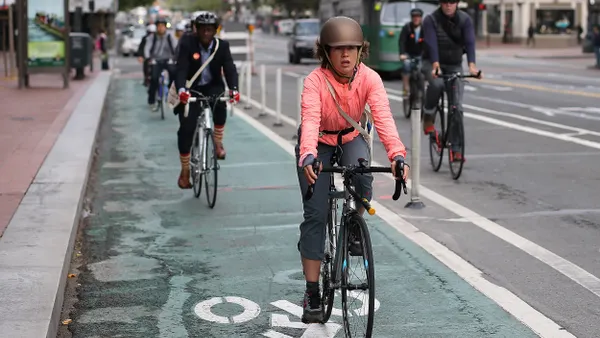IDC Government Insights announced the winners of its fourth annual Smart Cities North America Awards. The 13 winners are as follows:
| Category | Winning Entity | Project |
|---|---|---|
| Administration | Harris County Engineering Department, Harris County, Texas | ePermits |
| Civic Engagement | Arizona State University, Scottsdale, Arizona | Arizona State University Smart City Innovation Lab |
| Digital Equity and Accessibility | Ocala, Florida | Ocala Fiber Network |
| Education | Eugene School District 4J, Eugene, Oregon | Eugene School District 4J Comprehensive Distance Learning Technology Plan |
| Public Health and Social Services | Clark County, Nevada | CARES Housing Assistance Program |
| Public Safety | Las Vegas | Smart City and Parks |
| Smart Buildings (TIE) | NYC Mayor's Office of the Chief Technology Officer, New York | NYCx CoLabs: Housing Rights Challenge |
| Smart Buildings (TIE) | Colorado Smart Cities Alliance, Boulder, Colorado | EV Innovation Project |
| Sustainable Infrastructure | Santa Ana, California | Advanced Water Metering Infrastructure |
| Transportation (TIE) | Markham, Ontario, Canada | Automated Deficiency Reporting on Roads Using AI on Municipal Vehicles |
| Transportation (TIE) | Peachtree Corners, Georgia | Curiosity Lab at Peachtree Corners |
| Transportation Infrastructure | Center for Urban Informatics and Progress at the University of Tennessee-Chattanooga, Chattanooga, Tennessee | Pedestrian Analysis of the MLK Smart Corridor |
| Urban Planning and Land Use | Office of Innovation & Technology, Philadelphia | Using Artificial Intelligence and Machine Learning to Inspect City Roadways |
The awards are designed to recognize North American municipalities' progress in implementing smart cities projects. A key goal of the program is to share best practices and promote the acceleration of smart city developments.
"What we look to do is bring to light the variety and interesting types of projects done by cities, counties, states and educational institutions [that are] using technology in innovative ways and using emerging technologies," said Ruthbea Yesner, vice president of IDC Government Insights and Smart Cities and Communities Strategies. "There is innovation in local government and there are exciting things happening, and they are really focused on equity and accessibility and serving the public."
Although there is no monetary award, there is also no cost to apply, and cities are encouraged to self-nominate. The winning projects are selected based on ratings from smart city experts and input from a round of public voting. Yesner says it's important to balance the voting by incorporating input from these multiple groups.
"This is about community-building and learning and connecting people," Yesner said. "There's so much activity out there... and we learn from each other."
All of the selected projects stand out from the pool of nominees, but a few were unique in their approach to problems, she explained. The Arizona State University Smart City Innovation Lab, for instance, brings together the private and public sectors to co-develop projects with the university and share information to create innovative solutions.
A project in Boulder, Colorado, installed a vehicle-to-building electric vehicle (EV) charger that lets electricity flow back and forth between EVs and charging infrastructure instead of the typical one-way flow from charger to EV. This can help optimize electricity consumption, especially during peak demand, and lower costs. It also can contribute to electrical grid resilience and reduce the likelihood of power outages.
"That's super-cutting-edge and changes the discussion about energy management and sustainability," Yesner said. "That's one project to showcase for being innovative and thinking outside the box."
Meanwhile, Clark County, Nevada, came up with a way to use CARES funding to provide housing assistance to vulnerable populations or people at risk of being displaced during the pandemic.
"What we saw during the pandemic was that local governments, in general, are able to be innovative and responsive and even flexible and agile when [they] need to be. Those are qualities of smart cities," Yesner said. "When push came to shove and there was a crisis, we saw a push from local government to support the public."











